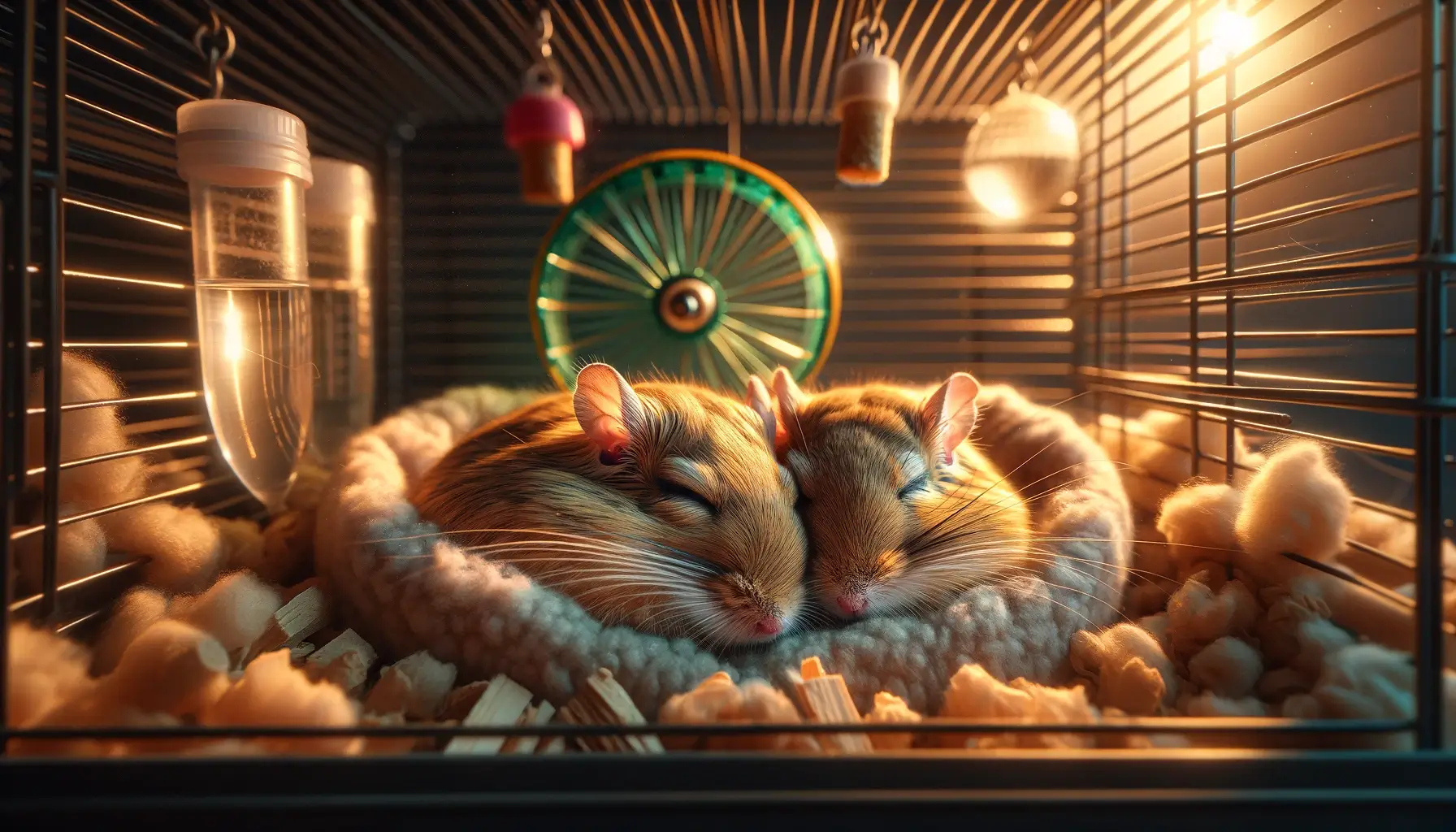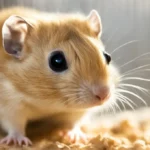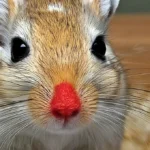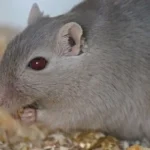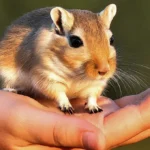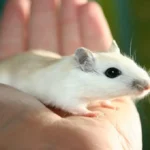As the seasons change, so do the behaviors of our small furry friends, particularly gerbils. Many pet owners observe a shift in their gerbil’s activity levels as the temperature drops, leading to questions about their winter habits. A common query that arises is whether gerbils hibernate during the colder months.
In this article we will shed light on gerbil behavior in winter, also debunk common misconceptions, and provide essential care tips to ensure your gerbil remains happy and healthy throughout the season.
Do Gerbils Hibernate?
Definition of Hibernation
Hibernation is a state of deep sleep that some animals enter to conserve energy during the winter when food is scarce. During hibernation, an animal’s body temperature, heart rate, and metabolic rate significantly decrease. This physiological state allows them to survive on stored body fat.
Gerbil Physiology and Hibernation
Contrary to some beliefs, gerbils do not hibernate. These small rodents are adapted to survive in desert environments, where they live in burrows to escape the heat rather than the cold. Gerbils maintain a relatively constant body temperature and do not undergo the drastic metabolic changes associated with hibernation.
- Body Temperature Regulation: Gerbils are homeothermic, meaning they keep their body temperature within a specific range despite external temperature changes. This ability is crucial for their survival in their natural habitat and is a key reason why they do not need to hibernate.
- Metabolic Rate: Unlike hibernating animals that slow their metabolic rate to conserve energy, gerbils remain relatively active and continue to eat, drink, and exercise, albeit at a reduced rate during colder months.
Differences Between Lethargy and Hibernation in Gerbils
It’s important to distinguish between lethargy and hibernation. Lethargy in gerbils can occur due to various factors, including illness or inadequate environmental conditions, such as being kept in a too-cold room.
Lethargic gerbils may appear less active and spend more time sleeping, but this state does not involve the physiological changes seen in hibernation.
Environmental Factors Affecting Gerbil Activity
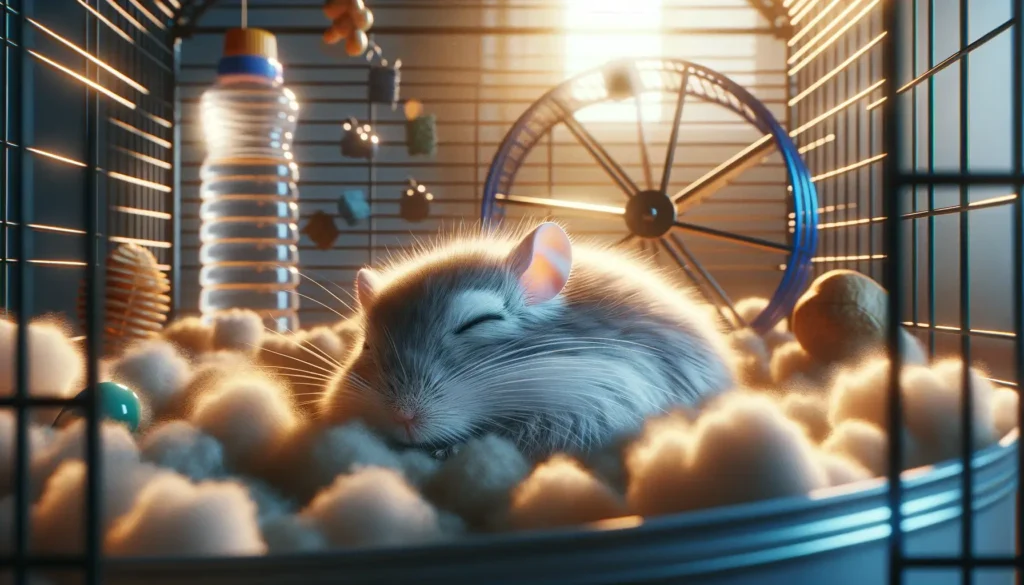
Optimal Temperatures for Gerbils
Gerbils thrive in temperatures between 65°F and 75°F (18°C to 24°C). When the temperature falls below this range, gerbils can become lethargic as their bodies work harder to maintain their internal temperature. It’s crucial to monitor the temperature of your gerbil’s environment, especially during winter, to prevent lethargy related to cold stress.
Signs of Lethargy Due to Cold
- Decreased activity and enthusiasm for play
- Spending more time sleeping or huddled in bedding
- Reduced interest in food or water
If you notice these signs, it’s essential to assess the temperature of your gerbil’s living space and make necessary adjustments.
How to Safely Warm Up Your Pet?
If your gerbil shows signs of lethargy due to cold, gently warm them by increasing the room temperature or providing additional bedding for insulation. Avoid direct heat sources like heating pads, as these can cause overheating or burns.
Instead, focus on creating a stable, warm environment that allows your gerbil to gradually adjust its body temperature.
How to Care for a Gerbil During Winter?
As the chill of winter sets in, gerbil owners must take extra care to ensure their pets remain comfortable and active. While gerbils do not hibernate, the colder months can still affect their well-being. Here are essential tips for gerbil care during winter to keep your furry friend in high spirits.
Maintaining a Comfortable Habitat
The key to a happy gerbil in winter is a warm and cozy habitat. Ensure your gerbil’s enclosure is kept away from drafts and in a room that maintains a steady temperature between 65°F and 75°F (18°C to 24°C).
Consider adding extra bedding to their home, allowing them to burrow and create a snug nest. Materials like shredded paper or hay are excellent for insulation and comfort.
Dietary Adjustments for Colder Months
While gerbils don’t hibernate and therefore don’t require a significant change in diet, ensuring they have access to a balanced and nutritious diet is crucial. Winter might increase their energy expenditure as they work to stay warm.
Incorporate a variety of seeds, grains, and occasional fresh produce to keep them healthy. Also, ensure they have constant access to fresh water, as hydration plays a vital role in their overall health.
Monitoring and Preventing Lethargy
Keep an eye on your gerbil’s activity levels during winter. A slight decrease in activity is normal, but if you notice significant lethargy or disinterest in food and play, it might be a sign of discomfort or illness. Regularly interact with your gerbil to encourage movement and check if the ambient temperature needs adjusting.
Myths vs. Facts About Gerbils and Hibernation
Debunking Common Myths
- Myth: Gerbils need to bulk up on food in winter to prepare for hibernation.
- Fact: Gerbils do not hibernate and should maintain a consistent, balanced diet year-round.
- Myth: It’s normal for gerbils to sleep all day in winter.
- Fact: While slight changes in activity are normal, excessive sleepiness and lethargy could indicate an issue with temperature or health.
Understanding Gerbil Behavior and Physiology
Gerbils are desert animals adapted to survive in environments with extreme temperature fluctuations. Their bodies are designed to regulate their temperature efficiently, negating the need for hibernation. Understanding this aspect of gerbil physiology helps owners provide the best care, ensuring these small pets thrive even in the coldest months.
FAQs
Can Gerbils Enter a Hibernation-like State?
No, gerbils do not enter a true hibernation state. They may become less active in colder temperatures, but this is not hibernation. It’s crucial to maintain an optimal living environment to prevent lethargy.
Is My Gerbil Dead or Hibernating?
Gerbils do not hibernate. If your gerbil is unresponsive, it’s crucial to gently check for signs of life like breathing or movement. If there’s no response, consult a vet immediately as gerbils can become lethargic due to cold but should not become unresponsive.
How Do I Know If My Gerbil Is Just Sleeping More or Lethargic?
Gerbils are naturally active and curious. If your gerbil is sleeping more than usual but still shows interest in food, play, and interaction when awake, it’s likely just adjusting to the colder season. However, if it shows disinterest in these activities or appears weak, it may be lethargic, indicating a need for warmer conditions or a vet visit.
What Should I Do If My Gerbil Becomes Lethargic?
First, ensure the habitat is warm enough and free from drafts. Increase the bedding and consider moving the enclosure to a warmer room. If lethargy persists without improvement, consult a veterinarian to rule out any health issues.
Conclusion
Ensuring your gerbil’s comfort during winter is paramount. Keep their environment warm, offer a balanced diet, and monitor their activity to distinguish between normal behavior and signs of distress.
Understanding that gerbils do not hibernate but may show reduced activity in colder months will help you provide the care they need. With attentive care, your gerbil can enjoy a healthy and active winter season.

